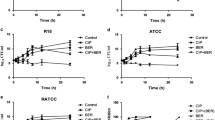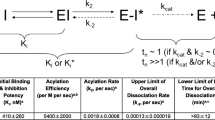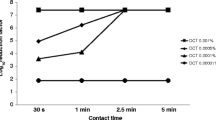Abstract
Antibiotic activity against common respiratory pathogens can be affected by the pH of the medium (in vitro) or the bodily fluid (in vivo) in which bacteria are present. The ionized fraction of an antibiotic is not able to efficiently penetrate bacterial or mammalian membranes, reducing the quantity of molecules able to exert their antibacterial effect resulting in elevated MIC values This study shows that the activity of macrolide antibiotics is particularly sensitive to acidic conditions, whereas a ketolide and fluoroquinolones are much less affected. Furthermore, induction of spontaneous and multistep macrolide resistance is greatly increased in acidic medium. In contrast, telithromycin and moxifloxacin did not induce resistance at any pH. Antibiotics which are less likely to induce resistance in vitro may also be less likely to induce the development of resistance in patients with respiratory tract infections.
Similar content being viewed by others
Author information
Authors and Affiliations
Corresponding author
Rights and permissions
About this article
Cite this article
Dalhoff, A., Schubert, S. & Ullmann, U. Effect of pH on the in Vitro Activity of and Propensity for Emergence of Resistance to Fluoroquinolones, Macrolides, and a Ketolide. Infection 33 (Suppl 2), 36–43 (2005). https://doi.org/10.1007/s15010-005-8206-y
Issue Date:
DOI: https://doi.org/10.1007/s15010-005-8206-y




